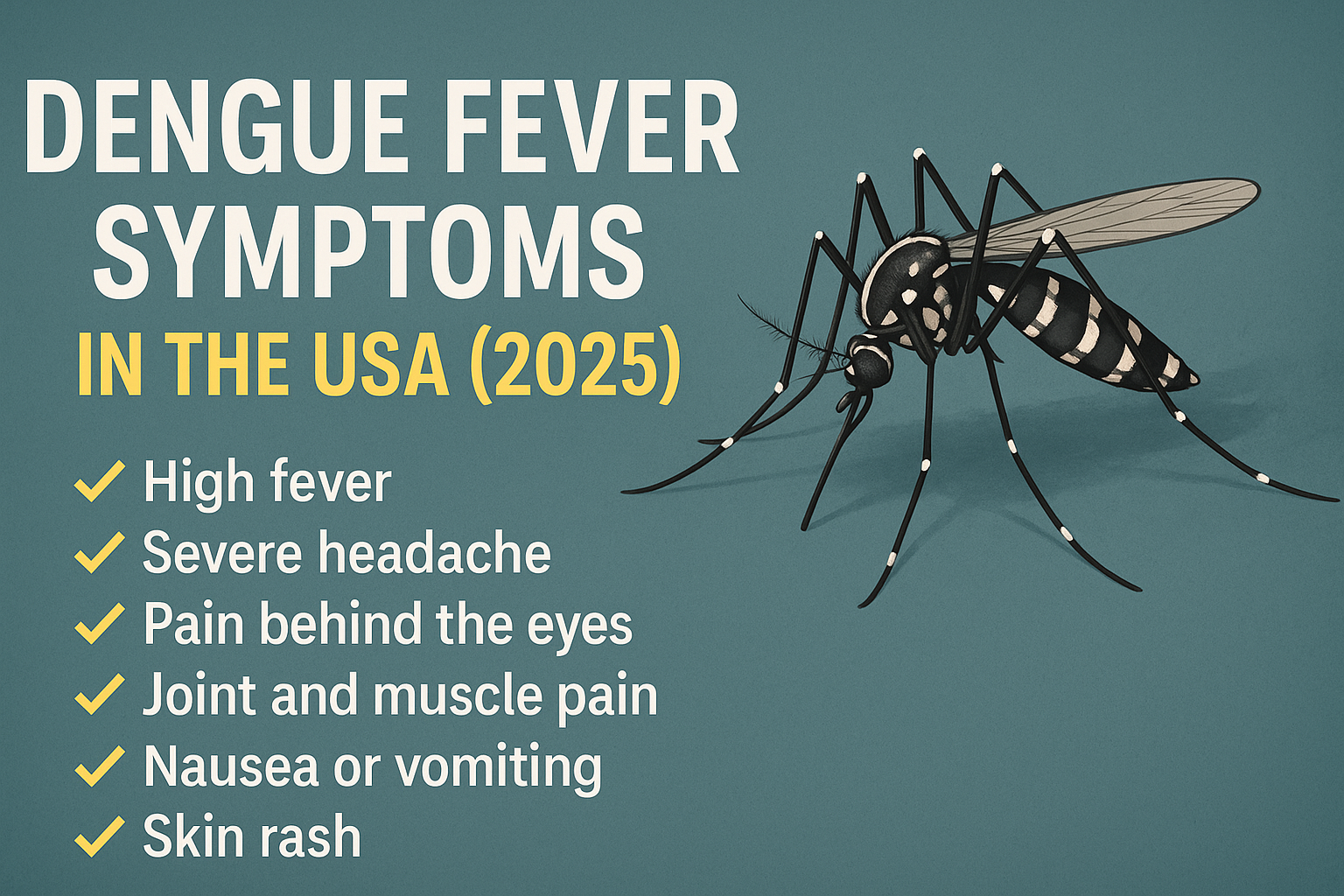What is Dengue?
Dengue fever symptoms are a growing concern in 2025, especially across parts of the United States. Dengue is a mosquito-borne viral infection caused by the dengue virus (DENV), transmitted primarily by the Aedes aegypti mosquito. Though traditionally associated with tropical regions, dengue is now spreading in parts of the USA due to environmental and travel-related factors.
Why Dengue Is Trending in the USA in 2025
Due to climate change, urbanization, and increased international travel, dengue infections have spiked in states like Florida, Texas, and California. According to the CDC, over 2,000 confirmed cases of dengue have already been reported in 2025, with Florida experiencing the highest surge.
This rise in local transmission has prompted the CDCto issue health alerts, making it essential for the public to recognize dengue fever symptoms early and take preventive actions.
Dengue Fever Symptoms: What to Watch For
One of the most frequently searched health questions in the USA this year is:
“What are dengue fever symptoms?”
The symptoms usually appear 4 to 10 days after a mosquito bite and can last up to a week or more.
Most Common Dengue Fever Symptoms:
-
High fever (often 104°F or higher)
-
Severe headaches
-
Pain behind the eyes
-
Joint and muscle pain (also known as “breakbone fever”)
-
Fatigue and general weakness
-
Nausea or vomiting
-
Skin rash (typically 2–5 days after the fever starts)
In some cases, symptoms may be mild and mistaken for the flu. But dengue is far more dangerous if not treated properly.
Signs of Severe Dengue (Dengue Hemorrhagic Fever)
While most people recover in a few days, some may develop severe dengue, which can lead to life-threatening complications like:
Severe abdominal pain
Bleeding gums or nose
Blood in vomit or stool
Difficulty breathing
Low blood pressure (shock)
Organ failure
These symptoms require immediate emergency care and hospitalization.
Who Is Most at Risk?
Some individuals are more likely to suffer serious complications from dengue, including:
-
Infants and young children
-
Elderly individuals
-
People with weak immune systems or chronic illnesses
-
Those who have had dengue before (increased risk of severe dengue upon reinfection)
In 2025, states with warmer climates and high mosquito density, such as Texas and Florida, have seen a dramatic rise in dengue-related ER visits.
There is no specific cure for dengue, so prevention is critical.
Practical Prevention Tips:
-
Eliminate standing water (flowerpots, buckets, tires)
-
Use mosquito repellents with DEET or picaridin
-
Wear protective clothing (long sleeves, pants)
-
Sleep under mosquito nets or in screened rooms
-
Stay indoors during dawn and dusk, when Aedes mosquitoes are most active
Even in the U.S., mosquitoes can breed in urban environments — making regular cleaning and awareness essential.
Diagnosis and Treatment of Dengue
Doctors diagnose dengue through blood tests that detect the virus or antibodies.
Treatment:
Rest and hydration
Use acetaminophen (Tylenol) to reduce fever and pain
Avoid aspirin and ibuprofen, which increase bleeding risks
Monitoring dengue fever symptoms regularly and seeking early medical care can help prevent severe complications.
Why Dengue Is Dangerous
Diagnosis typically involves:
-
Blood tests to detect viral RNA or antibodies
-
Platelet count monitoring (dengue can cause low platelets)
Treatment Options:
-
Rest and fluid intake
-
Acetaminophen (Tylenol) for fever and pain
-
Avoid aspirin, ibuprofen, and NSAIDs, as they increase bleeding risks
Timely monitoring of dengue fever symptoms can reduce the risk of complications and help you recover faster.
2025 USA Dengue Hotspots
| State | Reported Cases | Risk Level |
|---|---|---|
| Florida | 780+ | High |
| Texas | 610+ | High |
| California | 320+ | Moderate |
| Puerto Rico | 2,500+ | Severe |
These numbers are growing, and new cases are being reported weekly. Stay updated through the CDC or your local health department.
Final Thoughts: Stay Alert About Dengue Fever Symptoms
With the rapid spread of dengue in the United States, understanding the early dengue fever symptoms is more important than ever. Knowing what to look for and how to respond can protect your health and that of your loved ones.
🔒 Your Action Plan:
-
Recognize early symptoms
-
Prevent mosquito exposure
-
Seek medical help promptly
Early detection of dengue fever symptoms could mean the difference between a full recovery and a life-threatening situation. Stay informed. Stay safe. Stay mosquito-free.




